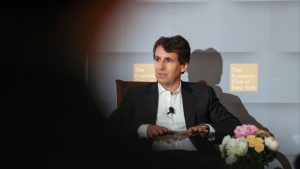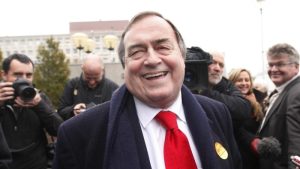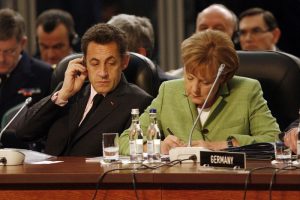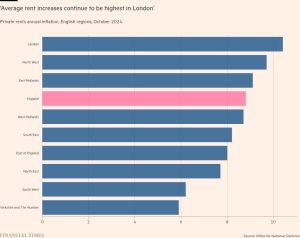Power and antiquity collide in the City of London
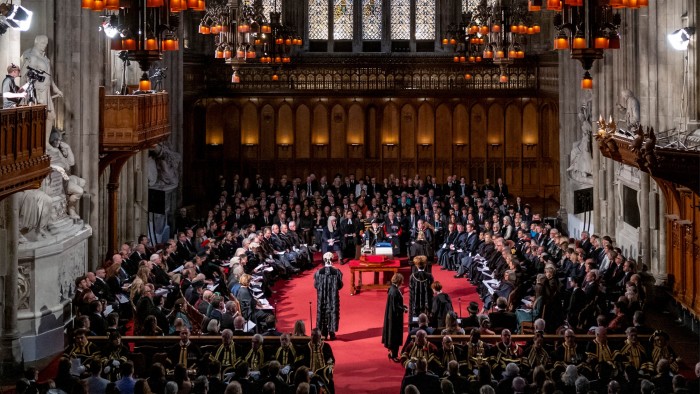
Unlock the Editor’s Digest for free
Roula Khalaf, Editor of the FT, selects her favourite stories in this weekly newsletter.
Sitting at the back of the Great Hall in the City of London’s historic Guildhall, I crane my neck to see Alastair King place his hat on his head and, simultaneously, Michael Mainelli remove his own.
This moment, watched by hundreds of robe-clad officials and curious members of the public who have won tickets in a ballot, marks the transfer of the office of Lord Mayor of the City of London.
The 20-minute ceremony — conducted in silence but for a short declaration by the incoming mayor and the periodic chiming of an errant mobile phone — has an air of medieval cosplay. White-gloved officials in all manner of hats and robes engage in an elaborate sequence of choreographed nodding and handshakes, and make offerings of regalia such as a sword and mace, which symbolise the lord mayor’s authority.
Luckily, I have some idea what is going on because TV screens line the walls, offering a better view. And because on each seat lies a sheet of paper listing the participants and order of events, including lines like: “The Swordbearer advances, making three reverences . . . The Common Cryer and Serjeant-at-Arms takes the Mace with the same ceremony.”

This handover of power on November 8 was hardly the most newsworthy of the week — it came three days after the US presidential election. It may not even have been the most consequential in the City of London that day — Schroders changed chief executive that afternoon.
But King, who spoke to me before his inauguration as the 696th lord mayor, insists people are wrong to “lazily” dismiss the unpaid role as ceremonial. “It drives me bananas,” he says when we meet in a drab basement in the bowels of the Mansion House, where he will live during his tenure with his wife Florence, and his dog — also Florence (named before he met his spouse).
“It’s obviously a bit of a ceremonial thing,” he concedes. But he adds that such duties are only “a tiny percentage” of the job, which can be “an incredible agent for change, a catalyst for businesses to create jobs”.
After emerging from a convoluted selection process involving livery companies representing trades from fishmongers to solicitors, and the City’s aldermen (a form of elected representative), King will spend the next year meeting politicians and businesses as “cheerleader-in-chief” for the UK’s financial and professional services industries.
The lord mayor should not be confused with the mayor of London, Sadiq Khan, who is elected directly and has a £21bn budget and significant powers. King, by comparison, will be the nominal head of the City of London Corporation — the governing body for the capital’s traditional financial district.

The perk of living in the Mansion House in the heart of London is not all that it may seem. “The plasterwork is wonderful but the plumbing is terrible,” confided one former resident. But each year the grand 18th-century building displays the convening power of the lord mayor, who hosts politicians, regulators and bankers for a dinner with speeches by the UK’s chancellor and the governor of the Bank of England.
By chance, this year’s dinner takes place during King’s first week on the job. Attendees are a who’s who of company chairs and chief executives, regulators, politicians and senior government officials. The bosses of the London Stock Exchange, Aviva, Schroders, Lloyds Banking Group, and the UK heads of Goldman Sachs, Citigroup and HSBC are all here.
Chancellor Rachel Reeves, sitting to King’s right during dinner in the grand Egyptian Hall, wins approval with well-trailed plans to overhaul pensions and a promise to ease regulation on the financial sector. In a concession to modernity, she delivers her address from an autocue.
But some traditions remain. Toasts on the evening include one proposed by King to “the bankers and merchants of the City of London and the health of the governor of the Bank of England”.
Away from the pomp and ceremony, King says he wants to use his term to push more domestic capital into UK-listed companies. He is optimistic: “You’re lent this role for a year. You have very little pure political power. But . . . people will generally take your phone call and accept invitations to come and have a chat.”
Photography by Charlie Bibby
#Power #antiquity #collide #City #London

